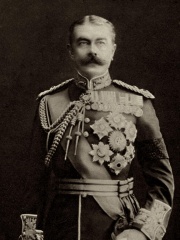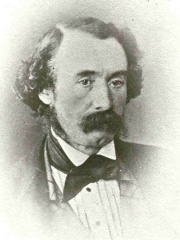

The Most Famous
ENGINEERS from Ireland
Top 2
The following people are considered by Pantheon to be the most legendary Irish Engineers of all time. This list of famous Irish Engineers is sorted by HPI (Historical Popularity Index), a metric that aggregates information on a biography's online popularity.

1. Herbert Kitchener, 1st Earl Kitchener (1850 - 1916)
With an HPI of 79.10, Herbert Kitchener, 1st Earl Kitchener is the most famous Irish Engineer. His biography has been translated into 50 different languages on wikipedia.
Field Marshal Horatio Herbert Kitchener, 1st Earl Kitchener (; 24 June 1850 – 5 June 1916) was an Anglo-Irish British Army officer and colonial administrator. Kitchener came to prominence for his imperial campaigns, his involvement in the Second Boer War, and his central role in the early part of the First World War. Kitchener was credited in 1898 for having won the Battle of Omdurman and securing control of the Sudan, for which he was made Baron Kitchener of Khartoum. As Chief of Staff (1900–1902) in the Second Boer War he played a key role in Lord Roberts' conquest of the Boer Republics, then succeeded Roberts as commander-in-chief – by which time Boer forces had taken to guerrilla fighting and British forces imprisoned Boer and African civilians in concentration camps. His term as commander-in-chief (1902–1909) of the Army in India saw him quarrel with another eminent proconsul, the viceroy Lord Curzon, who eventually resigned. Kitchener then returned to Egypt as British agent and consul-general (de facto administrator). In 1914, at the start of the First World War, Kitchener became secretary of state for war, a cabinet minister. One of the few to foresee a long war, lasting for at least three years, and having the authority to act effectively on that perception, he organised the largest volunteer army that Britain had seen, and oversaw a significant expansion of material production to fight on the Western Front. Despite having warned of the difficulty of provisioning for a long war, he was blamed for the shortage of shells in the spring of 1915 – one of the events leading to the formation of a coalition government – and stripped of his control over munitions and strategy. On 5 June 1916, Kitchener was making his way to Russia on HMS Hampshire to attend negotiations with Tsar Nicholas II when in bad weather the ship struck a German mine 1.5 miles (2.4 km) west of Orkney, Scotland, and sank. Kitchener was among 737 who died.

2. Robert Mallet (1810 - 1881)
With an HPI of 58.63, Robert Mallet is the 2nd most famous Irish Engineer. Her biography has been translated into 18 different languages.
Robert Mallet (3 June 1810 – 5 November 1881) was an Irish geophysicist, civil engineer, and inventor who distinguished himself by pioneering research concerning earthquakes, and is sometimes regarded as the father of seismology. For his major foundational work in seismology, he received the Telford Medal in 1859, the Cunningham Medal in 1862, the Wollaston Medal in 1877, and also became a member of the Royal Society in 1854. Mallet began his career as an apprentice in his father's iron foundry company and grew the family business into one of the largest engineering firms in Ireland. He started researching in the study of earthquakes during his time at various academies, including the Royal Irish Academy in 1832, the British Association for the Advancement of Science in 1835, and the Royal Geological Society of Ireland in 1838. His son, Frederick Richard Mallet, was also a geologist who worked in India. He retired in the 1870s, after becoming blind for the last seven years of his life, and died near London in 1881. He was buried at West Norwood Cemetery.
People
Pantheon has 2 people classified as Irish engineers born between 1810 and 1850. Of these 2, none of them are still alive today. The most famous deceased Irish engineers include Herbert Kitchener, 1st Earl Kitchener, and Robert Mallet.

